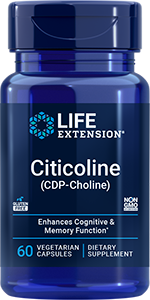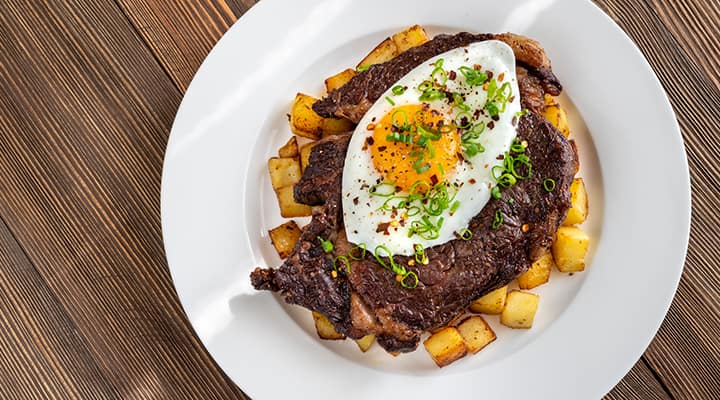
What Is Choline? Top Benefits and Food Sources
Published: April 2025
You might want to quit tossing your egg yolks and skipping soy. These foods are rich in choline, an important brain nutrient many of us could use more of. Choline is essential for mood health and cognitive function, yet many of us don't meet the levels for adequate choline intake.
So how do we raise our levels of choline? If we're not frying omelets and snacking on edamame on the regular, it might be worth looking to choline supplements as a second line of defense. Here's what you should know about this important cognitive nutrient and how to get more of it in your daily diet.
What is choline?
Choline is an important nutrient that plays a key role in healthy brain function, metabolism and cellular health. It helps build cell membranes, influences gene expression, and supports nerve signaling by producing acetylcholine. This neurotransmitter is vital for brain and nervous system functions, including supporting mood, memory, muscle function and more.
While the body can produce small amounts of choline on its own, it's not enough to meet our daily needs. That means we need to get most of our choline from food. And it turns out that many of us don't get enough dietary choline from the foods we consume on a daily basis.
What does choline do for your brain?
Choline helps build cell membranes by making the phospholipids phosphatidylcholine and sphingomyelin, which are vital for cellular structure. But choline’s biggest job in the brain is producing neurotransmitters that help nerve cells communicate with each other. Acetylcholine is considered an excitatory neurotransmitter because it triggers, or "excites," nerve cells to send signals from your brain to your body. It supports key brain functions, including memory, learning, attention, motivation and arousal.
So it's critical for daily functions like staying focused at work as well as processes like forming long-term memories.
Acetylcholine also plays a vital role in the nervous system and muscles. It’s the main neurotransmitter at the neuromuscular junction, where it signals muscles to contract. It also helps support the parasympathetic nervous system, which handles functions such as digestion and heart rate.
What are the main benefits of choline?
Most of choline's health benefits are related to the brain, but this nutrient is good for more than just your noggin. Choline also supports the production of phosphatidylcholine, an important phospholipid for nerve growth and function and cellular membrane repair.
Studies on the effects of CDP-choline, or citicoline, a choline precursor, have found it:
Supports memory and learning
. Since choline encourages the production of acetylcholine, the neurotransmitter essential for healthy cognition, it can help support memory function. One study found that 500 mg of CDP-choline daily for 12 weeks was associated with improved working memory, short-term memory, attention and overall memory performance.Promotes healthy cognition and attention
. Studies have found CDP-choline is a neuroprotectant and a promoter of neuroplasticity, supporting healthy cognition and overall brain function. Because of its protective role, choline supplementation becomes increasingly important for brain health as we age.Encourages mood health
. In addition to its well-studied brain power benefits, low doses of CDP-choline have been shown to support a healthy mood.
Explore Our Best Brain Health Supplements
What is the best form of choline?
There are a few different sources of choline—you can get the nutrient from both foods and supplements. Some of the popular types of choline supplementation include:
Citicoline (also known as CDP-choline)
: Studies show this choline precursor is highly available and well-absorbed in the body. Citicoline encourages the production of acetylcholine and helps support memory, focus and overall cognition.Alpha-GPC
: Alpha-GPC is short for alpha-glyceryl phosphoryl choline. It's derived from lecithin, and it's well-absorbed. Alpha-GPC supports healthy cognitive function by promoting the production of acetylcholine.Choline bitartrate
: This form of choline is widely used in supplements. Its derivative, betaine, helps convert the amino acid homocysteine into the amino acid methionine through an enzyme called BHMT.
Does choline help with memory and cognition?
Observational studies show that higher dietary choline intake, either through foods or choline supplementation, is linked to better cognitive performance and a reduced risk of age-related decline. Some studies have found that "moderate dietary choline intake," which translates to consuming 332.89 mg to 353.93 mg of choline per day, can help support cognition.
Studies also show that people with higher intakes of choline and phosphatidylcholine performed better on cognitive tests, especially in areas like verbal fluency and memory.
Top dietary sources of choline
The liver makes some choline (in the form of phosphatidylcholine) but not enough to meet our body's needs. Women need 425 mg of choline per day, while men need 550 mg per day. Pregnant women need 450 mg per day; breastfeeding women need 550 mg per day.
You can increase your intake of choline through certain foods, especially animal-based ones. Plant foods like soybeans and quinoa also contain choline, and they can help fill the nutrition gap for those who avoid animal foods.
Some of the top dietary sources of choline include:
- Beef and beef liver
- Chicken and chicken liver
- Egg yolks
- Soybeans
- Fish
- Potatoes
- Wheat germ
- Beans
- Quinoa
- Dairy milk
Choline supplementation is another easy way to improve your intake, especially as you age. Supplements can also help you be consistent in your nutrition, even if your diet is not.
Get smart about supporting your brain! Our health quiz can deliver personalized supplement recommendations based on your lifestyle.
References
- Gareri P, et al. "The role of citicoline in cognitive impairment: pharmacological characteristics, possible advantages, and doubts for an old drug with new perspectives." Clin Interv Aging. September 2015. https://pubmed.ncbi.nlm.nih.gov/26366063/
- Guan F, et al. "Vertical Association Between Dietary Total Choline and L-alpha-glycerylphosphorylcholine and the Cognitive Function in Chinese Adults Aged over 55, Result from China Health and Nutrition Survey 1997-2018." Nutrients. October 2024. https://pubmed.ncbi.nlm.nih.gov/39519545/
- Kansakar U, et al. "Choline supplements: An update." Front Endocrinol (Lausanne). March 2023. https://pmc.ncbi.nlm.nih.gov/articles/PMC10025538/
- Nakazaki E, et al. "Citicoline and Memory Function in Healthy Older Adults: A Randomized, Double-Blind, Placebo-Controlled Clinical Trial." J Nutr. August 2021. https://pubmed.ncbi.nlm.nih.gov/33978188/
- Niu YY, et al. "Association of dietary choline intake with incidence of dementia, Alzheimer disease, and mild cognitive impairment: a large population-based prospective cohort study." Am J Clin Nutr. January 2025. https://pubmed.ncbi.nlm.nih.gov/39521435/
- Roohi-Azizi M, et al. "Citicoline Combination Therapy for Major Depressive Disorder: A Randomized, Double-Blind, Placebo-Controlled Trial." Clin Neuropharmacol. January-February 2017. https://pubmed.ncbi.nlm.nih.gov/28085707/
- Secades JJ, Gareri P. "Citicoline: pharmacological and clinical review, 2022 update." Rev Neurol. November 2022. https://pubmed.ncbi.nlm.nih.gov/36544369/
- Ylilauri MPT, et al. "Associations of dietary choline intake with risk of incident dementia and with cognitive performance: the Kuopio Ischaemic Heart Disease Risk Factor Study." Am J Clin Nutr. December 2019. https://pubmed.ncbi.nlm.nih.gov/31360988/
- "Choline." National Institutes of Health. June 2022. https://ods.od.nih.gov/factsheets/Choline-HealthProfessional/
Always be in the know!
Access the latest deals, wellness news, expert health tips & more!










